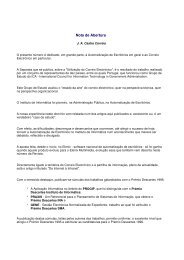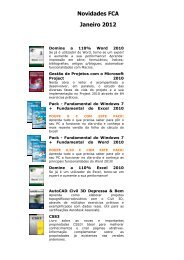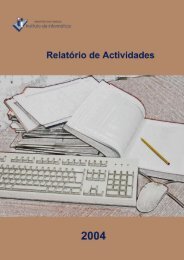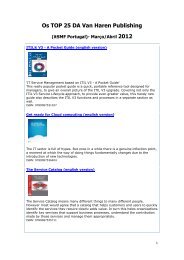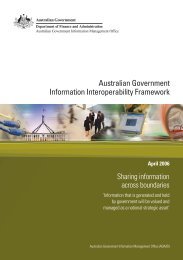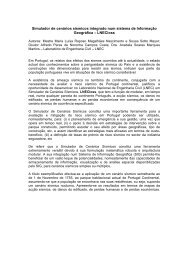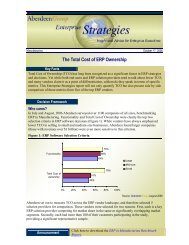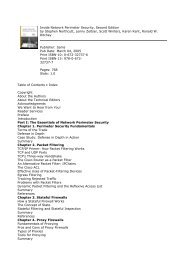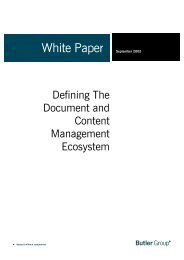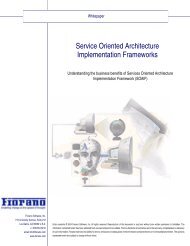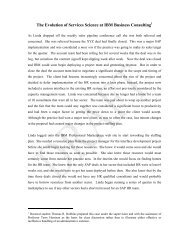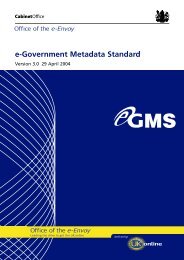OECD Peer Review of E-Government in Denmark - ePractice.eu
OECD Peer Review of E-Government in Denmark - ePractice.eu
OECD Peer Review of E-Government in Denmark - ePractice.eu
Create successful ePaper yourself
Turn your PDF publications into a flip-book with our unique Google optimized e-Paper software.
Box 6.1 Key e-government co-ord<strong>in</strong>ation councils and committees<br />
State <strong>Government</strong><br />
The State IT Council: convened <strong>in</strong> 2000 to contribute to effective application <strong>of</strong> ICT <strong>in</strong> the Danish public sector,<br />
the Council is a forum for exchang<strong>in</strong>g <strong>in</strong>formation, build<strong>in</strong>g co-operation, issu<strong>in</strong>g jo<strong>in</strong>t guidel<strong>in</strong>es and mak<strong>in</strong>g<br />
proposals around government ICT policy. It has a particular focus on matters related to organisational<br />
development. All m<strong>in</strong>istries have a senior manager represent<strong>in</strong>g them on the Council, which is chaired by the<br />
MVTU.<br />
The State IT Forum: established as a sub-committee <strong>of</strong> the State IT Council, the Forum has a more technical<br />
focus on matters related to procurement and use <strong>of</strong> ICT. All m<strong>in</strong>istries are represented <strong>in</strong> the Forum by their<br />
senior <strong>in</strong>formation or technology manager. Aga<strong>in</strong>, the Forum is chaired by the MVTU.<br />
Council for IT Security: established <strong>in</strong> 1995 as a successor to the National IT Security Council, which had primary<br />
responsibility for advis<strong>in</strong>g the Danish <strong>Government</strong> on ICT security matters, the Council has seven members<br />
appo<strong>in</strong>ted by the M<strong>in</strong>ister <strong>of</strong> Science, Technology and Innovation. Its work <strong>in</strong>volves promot<strong>in</strong>g an <strong>in</strong>formed public<br />
debate on ICT security, and contribut<strong>in</strong>g to Danish ICT security policy. The Council co-operates with the IT<br />
Security Division <strong>of</strong> the National IT and Telecom Agency to strengthen ICT security <strong>in</strong> <strong>Denmark</strong>.<br />
The Co-ord<strong>in</strong>at<strong>in</strong>g Information Committee: established <strong>in</strong> 1999 to ensure co-ord<strong>in</strong>ated use <strong>of</strong> ICT by the different<br />
levels <strong>of</strong> government, the Committee has supported implementation <strong>of</strong> various e-government <strong>in</strong>itiatives s<strong>in</strong>ce the<br />
<strong>in</strong>ception <strong>of</strong> Project e-<strong>Government</strong>. Chaired by the MVTU, the Committee consists <strong>of</strong> representatives from State,<br />
county and municipal government. The Committee has two technical sub-committees work<strong>in</strong>g on the Danish<br />
enterprise architecture and the government XML framework.<br />
Local <strong>Government</strong><br />
The Municipal Digitalisation Council: responsible for anchor<strong>in</strong>g and focus<strong>in</strong>g work on digitalisation <strong>in</strong> the<br />
municipalities, this council <strong>of</strong> municipal managers is appo<strong>in</strong>ted by Local <strong>Government</strong> <strong>Denmark</strong>. The Council helps<br />
to prioritise and co-ord<strong>in</strong>ate implementation <strong>of</strong> specific e-government <strong>in</strong>itiatives, with a focus on the<br />
organisational, structural and managerial side, rather than the technical side, <strong>of</strong> implementation.<br />
The Digital Counties: the counties’ e-government co-ord<strong>in</strong>at<strong>in</strong>g body conducts projects <strong>in</strong> areas <strong>of</strong> common<br />
<strong>in</strong>terest such as digital signatures, electronic document management and XML standardisation.<br />
In addition to provid<strong>in</strong>g various mechanisms for co-ord<strong>in</strong>ation <strong>of</strong> e-government, <strong>Denmark</strong> has<br />
also taken a more active role <strong>in</strong> facilitat<strong>in</strong>g e-government collaboration through the creation <strong>of</strong> “new<br />
service communities”. These <strong>in</strong>itiatives, supported by the Digital Task Force, facilitate collaboration<br />
among organisations that have common or related functions, services or user-groups that may benefit<br />
from jo<strong>in</strong>t implementation <strong>of</strong> e-government. Support <strong>of</strong> new service communities <strong>in</strong>cludes: 1)<br />
proactively identify<strong>in</strong>g opportunities for e-government collaboration and prepar<strong>in</strong>g relevant<br />
organisations to analyse and then pursue these opportunities; and 2) support<strong>in</strong>g collaboration<br />
<strong>in</strong>itiatives developed by organisations themselves. Examples <strong>of</strong> service community <strong>in</strong>itiatives<br />
supported by the Task Force s<strong>in</strong>ce 2002 <strong>in</strong>clude:<br />
• Adm<strong>in</strong>istration <strong>of</strong> medical benefits.<br />
• Digital services for families with small children.<br />
• Digital vehicle registration.<br />
• Establishment <strong>of</strong> the www.virk.dk bus<strong>in</strong>ess portal.<br />
• Selection <strong>of</strong> “medication” as a special focus area for development <strong>of</strong> a cross-sectoral<br />
bus<strong>in</strong>ess model.<br />
92



